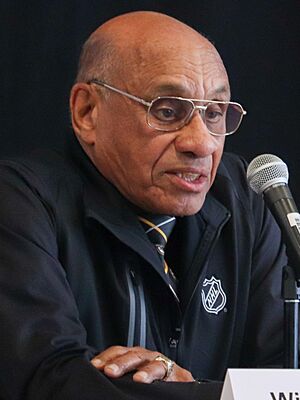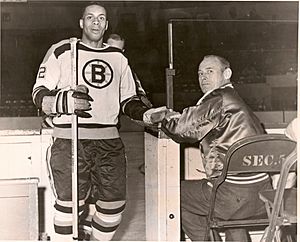Willie O'Ree facts for kids
Quick facts for kids Willie O'ReeCM ONB |
|||
|---|---|---|---|
| Hockey Hall of Fame, 2018 (Builder) | |||

O'Ree in 2020
|
|||
| Born | October 15, 1935 Fredericton, New Brunswick, Canada |
||
| Height | 5 ft 11 in (180 cm) | ||
| Weight | 180 lb (82 kg; 12 st 12 lb) | ||
| Position | Winger | ||
| Shot | Left | ||
| Played for | Boston Bruins | ||
| Playing career | 1958–1979 | ||
William Eldon O'Ree, often known as Willie O'Ree CM ONB, is a famous Canadian ice hockey player. He was born on October 15, 1935, in Fredericton, New Brunswick. Willie made history by becoming the first Black player to ever play in the National Hockey League (NHL). He played as a winger for the Boston Bruins.
People often call him the "Jackie Robinson of hockey" because he broke barriers in the sport, just like Jackie Robinson did in baseball. Willie even met Jackie when he was young! In 2018, Willie O'Ree joined the Hockey Hall of Fame. The NHL also created the annual Willie O'Ree Community Hero Award to honor him and his work.
Contents
Early Life and Learning Hockey
William Eldon O'Ree was born in Fredericton, New Brunswick. He was the youngest of nine children. His grandparents had moved to Canada to find freedom. There were only a few Black families in Fredericton when Willie was growing up.
Willie started skating when he was just three years old. He began playing organized hockey at age five. He often used the family's backyard rink to practice. When the weather was good, he would even skate to school! Willie wrote in his book, The Willie O’Ree Story: Hockey’s Black Pioneer, that his skin color was never an issue on the early rinks.
When Willie was 14, his older brother Richard taught him how to bodycheck. They played organized hockey together. Willie also played baseball for a team called the Fredericton West Enders. In October 1950, he won a trophy for being an outstanding player. A sportswriter even predicted he could become a star like Jackie Robinson. Willie met Jackie Robinson around this time. At 15, Willie played in the New Brunswick Amateur Hockey Association playoffs. He later played for the Fredericton Capitals. He also played for school teams, but sometimes rules about playing in other leagues made it tricky.
Playing in the NHL
Willie O'Ree began playing hockey outside his home province in September 1954. He joined the Quebec Frontenacs in the Quebec Junior Hockey League. He played for several junior teams in Quebec and Ontario. In 1955, he signed with the Quebec Aces of the Quebec Hockey League (QHL).
Before joining the NHL, Willie had a serious eye injury. He was hit by a puck and lost sight in his right eye. He kept this a secret because he was determined to play. If the Boston Bruins had known, he might not have been allowed to play in the NHL.
Willie made his NHL debut with the Boston Bruins on January 18, 1958. This made him the first Black player in the league's history! He played two games that year. He played 43 games for the Bruins during the 1960–61 NHL season.
During a game against the Chicago Blackhawks, Willie faced unfair comments from some players. An opposing player hit Willie, causing injuries. Willie reacted strongly, showing his toughness. Willie remembered that fans in some cities would shout mean and unfair things at him because of his race. He said it didn't bother him because he just wanted to be a hockey player. He believed if others couldn't accept that, it was their problem, not his.
After the 1960–61 season, Willie was traded. He felt he wasn't given a fair chance with the Montreal Canadiens team. Willie scored 4 goals and 10 assists in his NHL career, all in 1961.
Minor League Success
Willie O'Ree continued to play hockey in the minor leagues for many years. He won two scoring titles in the Western Hockey League (WHL) between 1961 and 1974. He scored 30 or more goals four times. His highest was 38 goals in the 1964–65 and 1968–69 seasons.
Most of Willie's time was with the Los Angeles Blades and the San Diego Gulls. The San Diego Gulls retired his number, which now hangs in their arena. Willie kept playing in the minor leagues until he was 43 years old!
Willie O'Ree's Impact on Hockey
After Willie O'Ree played in the NHL, it took until 1974 for another Black player, Mike Marson, to join the league. Today, there are many Black players in the NHL.
Since 1998, Willie has been the NHL's Diversity Ambassador. He travels across North America to schools and hockey programs. He shares important messages about including everyone, working hard, and believing in yourself.
The NHL works hard to make sure everyone feels welcome. Players learn about diversity, and unfair comments are not allowed. Willie O'Ree is often called the "Jackie Robinson of hockey" because he helped break down barriers in the sport.
Starting in the 2017–18 season, the NHL created the annual Willie O'Ree Community Hero Award. This award recognizes someone who has made a positive difference in their community through hockey.
Personal Life
Willie O'Ree moved to California in the United States. He married and had two sons. Later, he married Deljeet Kaur Manak O'Ree, and they have a daughter. He lives in La Mesa, California, where he moved in 1967 to play for the San Diego Gulls.
Honors and Achievements
Willie O'Ree has received many awards and honors for his contributions to hockey and society.
He was inducted into the New Brunswick Sports Hall of Fame in March 1984. In 1998, the National Hockey League asked him to become the director of youth development for its diversity task force. This program helps young people from diverse backgrounds learn and play hockey.
On January 19, 2008, the Bruins and the NHL honored Willie O'Ree. This celebrated the 50th anniversary of his NHL debut. A special exhibit about his career was created at The Sports Museum of New England. His hometown of Fredericton also named a new sports complex after him.
In 2008, Willie received the Order of Canada. This is the highest award a Canadian citizen can receive. He was honored for being a hockey pioneer and a mentor for young people. He also received the United States Congressional Gold Medal in 2022, which is the highest honor given by the U.S. Congress. He was the first NHL player to receive this award.
On June 26, 2018, it was announced that Willie O'Ree would be inducted into the Hockey Hall of Fame. He was recognized as a "builder" for his lasting impact on the sport. On January 18, 2022, the Boston Bruins retired his number 22 jersey. This means no other Bruins player will ever wear that number again, a great honor!
In 2020, Willie O'Ree was named to Canada's Sports Hall of Fame. In 2021, all NHL players wore a special helmet decal to honor Willie O'Ree during Black History Month. Canada Post released a special postage stamp honoring Willie O'Ree on October 30, 2023.
Awards and Honours
- WHL Second All-Star Team (1969)
- New Brunswick Sports Hall of Fame (1984)
- Lester Patrick Trophy (2003)
- Order of New Brunswick (2005)
- Willie O'Ree Place (Fredericton arena, dedicated 2008)
- Order of Canada (2008)
- Breitbard Hall of Fame (2008)
- Hockey Hall of Fame (2018)
- Congressional Gold Medal (2019)
- Canada's Sports Hall of Fame (2020–21)
- His #22 Jersey was retired by the Boston Bruins on January 18, 2022.
- Named One of the Top 100 Best Bruins Players of all Time.
Career Statistics
Regular season and playoffs
| Regular season | Playoffs | |||||||||||||
|---|---|---|---|---|---|---|---|---|---|---|---|---|---|---|
| Season | Team | League | GP | G | A | Pts | PIM | GP | G | A | Pts | PIM | ||
| WHL totals | 785 | 328 | 311 | 639 | 669 | 55 | 25 | 28 | 53 | 52 | ||||
| NHL totals | 45 | 4 | 10 | 14 | 26 | — | — | — | — | — | ||||
See also
 In Spanish: Willie O'Ree para niños
In Spanish: Willie O'Ree para niños
- List of sports desegregation firsts


